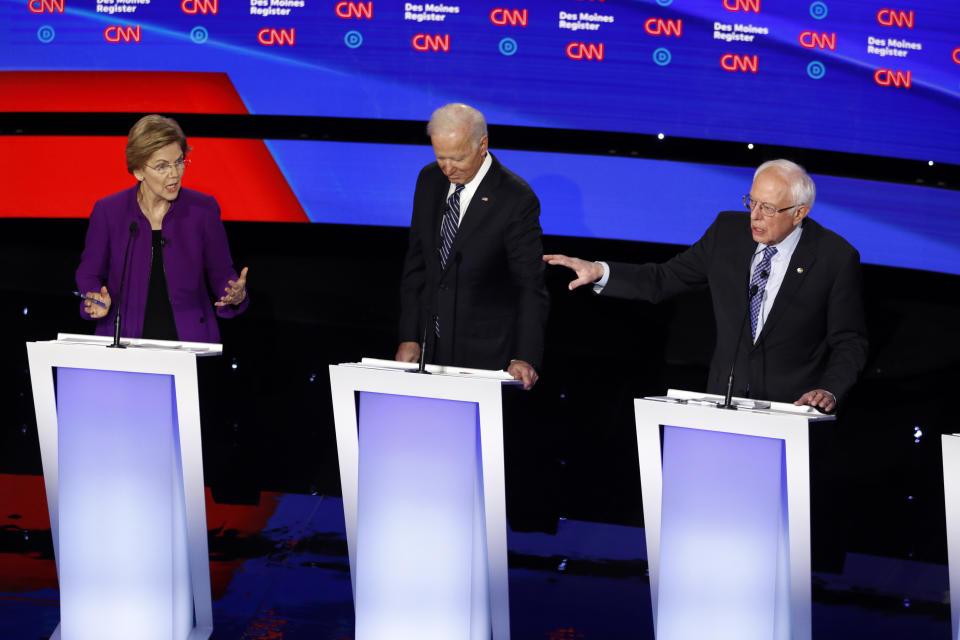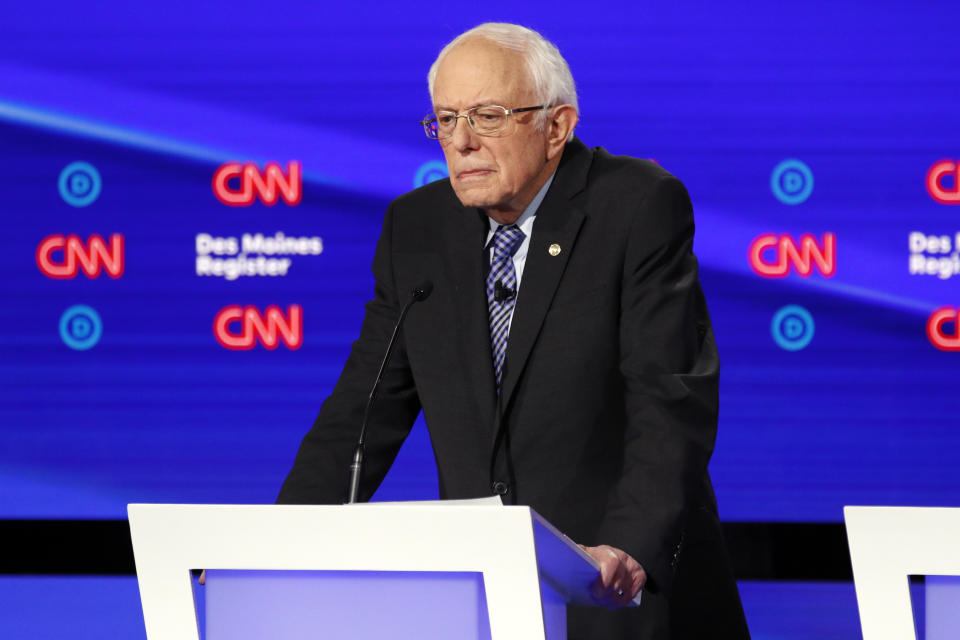Warren tackling sexism 'head on' was a gamble — but maybe her best shot
Welcome to 2020 Vision, the Yahoo News column covering the presidential race with one key takeaway every weekday and a wrap-up each weekend. Reminder: There are 18 days until the Iowa caucuses and 292 days until the 2020 election.
Sexism has almost certainly complicated Elizabeth Warren’s campaign for the presidency.
But what if finally calling it out — and drawing attention to the pernicious, self-fulfilling way that gender biases color perceptions of “electability” — winds up being the thing that helps her win?
As the all-important Iowa caucuses approach, new data suggest (tentatively) that it could.
At Tuesday night’s Democratic debate in Des Moines, the Massachusetts senator was faced with a difficult choice. For days the political press had been salivating over an irresistible story: the allegation, first reported by CNN, that Bernie Sanders had once told Warren a woman couldn’t beat Donald Trump in 2020. Sanders denied it. “Ludicrous,” he said in a statement. Soon Warren released a statement of her own: “I thought a woman could win,” she wrote. “He disagreed.”
The spat had everything. Drama. Gender. Progressive in-fighting. For months, Sanders and Warren had abided by an informal “nonaggression pact,” each refusing to wage war on the other in service of a greater goal: defeating Democratic moderates such as Joe Biden. Not anymore. Their supporters — especially Sanders’s — took to the barricades. #NeverWarren trended on Twitter and snake emojis often accompanied mentions of her.
So by the time the debate began, Warren knew the question was coming. In response, she decided not to deflect, but rather, as she put it, to “attack” the issue “head on.”
“I think the best way to talk about who can win is by looking at people’s winning record,” she said on stage in Des Moines. “So can a woman beat Donald Trump? Look at the men on this stage. Collectively, they have lost 10 elections. The only people on this stage who have won every single election that they’ve been in are the women.”
“Back in the 1960s, people asked, “Could a Catholic win?”’ Warren continued. “Back in 2008, people asked if an African-American could win. Both times, the Democratic Party stepped up and said yes, got behind their candidate and we changed America. That’s who we are.”

After the debate, Warren refused to play nice. “I think you called me a liar on national TV,” she told Sanders, denying him the customary post-debate handshake.
“What?” Sanders asked.
“I think you called me a liar on national TV,” Warren repeated.
Predictably, Warren’s shift from defense to offense has done little to quell tensions on the left — tensions that grew so acute by Thursday that a coalition of dozens of leading progressive groups felt compelled to call for a truce.
As for Warren herself, it’s difficult to overstate just how big a backlash she risked by escalating the conflict rather than changing the subject. On Tuesday, the Cut’s Rebecca Traister detailed the damned-if-you-do, damned-if-you-don’t gender dynamics at play in a post headlined “The Third Rail of Calling ‘Sexism.’”
“To acknowledge the realities of running as a woman — the double standards, the higher bars, the demands for likability and relatability in a nation that mostly only relates to and likes dudes … is a trap,” Traister wrote. “You will be understood as trying to leverage the bleak unfairness of it all to your benefit: as if you are the one to enter the arena with the advantage of getting to cry ‘Sexism!’ and not with the multiple disadvantages of … sexism.”
Polling supports Traister’s analysis. Studies have shown that women “who complain about sexism are seen as whiners, not winners,” as feminist writer Jessica Valenti pointed out earlier this week. “In our focus groups, participants consistently react negatively to anything from women that can even be perceived as whining or complaining,” Amanda Hunter, research and communications director at the Barbara Lee Family Foundation, recently told the New York Times.
In November, a New York Times/Siena College poll of battleground states found that 41 percent of Biden supporters who said they wouldn’t support Warren next November if she were nominee also agreed that most women who run for president “just aren’t that likable.” And survey after survey has shown that while the vast majority of Americans say they would be comfortable with a woman president (74 percent in a July Daily Beast/Ipsos poll), far fewer (33 percent) believe their neighbors would also be fine with that — the same suspicion about other people’s sexism Sanders allegedly referenced when questioning Warren’s so-called electability and that Warren then tried to allay during the debate.

So it’s no surprise that the preponderance of online takes, especially, like Traister’s, on the left, are characterizing Warren’s approach as a misstep in a minefield.
But they might be wrong.
What most of these arguments ignore is that Warren is currently in third place. Sanders is in second. To have any shot at winning the nomination, Warren has to beat her fellow progressive in Iowa. And she has only 18 days left. As FiveThirtyEight’s Nate Silver correctly notes, “nonaggression toward Warren is pretty clearly in the best interest of Sanders, who was in the stronger position than Warren heading into the debate and who would probably prefer to focus on Biden. But it’s probably not beneficial to Warren.” Silver then goes on to calculate that Warren will have a 50 percent or better chance of being the nominee if she wins Iowa; a 15-20 percent chance if she finishes second but ahead of Sanders and Biden (i.e., behind Pete Buttigieg, Amy Klobuchar or another dark horse); and a roughly 10 percent or less chance in any other scenario.
Hence Warren’s decision to shake up her relationship with Sanders. And while disrupting it along gender lines was probably the riskiest path, it could also be the most rewarding. In fact, we may already be seeing evidence of the upside. According to a new FiveThirtyEight/Ipsos poll that surveyed the same group of voters twice, both before and after Tuesday’s debate, Warren got the highest grade of any candidate for her performance. Warren was also the biggest winner in terms of attracting potential voters, gaining a little over 3 points in the share of respondents who said they were considering voting for her. And perceptions of Warren’s electability improved, while Sanders’s favorability ratings worsened — perhaps because she noted, correctly, that “since Donald Trump was elected, women candidates have outperformed men candidates in competitive races.”
It’s entirely possible, in other words, that Warren has enraged Sanders fans on Twitter while at the same time improving her chances of beating Sanders in Iowa. Both candidates are likely to clear the 15-percent threshold to remain in contention after the first round of balloting, meaning neither candidate’s supporters are likely to have to “realign” with their second choice. Any lingering bad blood, to the extent that it’s real and not just online, may not matter.

Which means the voters to watch, for now, aren’t necessarily Sanders’s — they’re Klobuchar’s, and Tom Steyer’s, and the others whose favorites might be eliminated in the early rounds. Women in that voter pool will be worth paying particular attention to. The most recent Iowa survey to share demographic information, released before Tuesday’s debate by Monmouth University, shows that overall, Warren trails only Biden among women, and she is the top second pick among women by a significant margin. Last May, more than a third of Democratic women (37 percent) told Pew Research Center that they would be more enthusiastic if their nominee were a woman, and nearly half of Democratic women ages 18 to 49 (45 percent) said the same.
In 2008, Barack Obama described his Iowa victory “as the moment when we tore down barriers that have divided us for too long.” Who knows if Warren will be able to make the same sort of claim on caucus night 2020. But by reframing her candidacy Tuesday in similar terms — by equating a vote for Elizabeth Warren with a vote for the idea of a woman president — she potentially tapped into a similar sentiment. Sure, it may not be enough. But it may also be her last best shot.
Read more from Yahoo News:
Did the U.S. 'assassinate' Iranian general or just kill him? Why it matters
Saudis warn of new destructive cyberattack that experts tie to Iran
Your Democratic primary cheat sheet: In the run-up to Iowa, who's still in the race?
PHOTOS: Ukraine International Airlines plane crashes in Iran killing all on board




